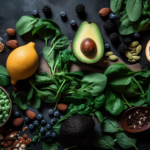Table of Contents
Fueling Your Performance: Navigating the World of Nutritious Eating for Active Individuals
Hey there, all you active folks out there! If you’re reading this, chances are you’re an athlete, or maybe just someone who loves to stay fit and active. Well, kudos to you!
We all know that when it comes to reaching our peak performance, exercise is only part of the equation. That’s right, folks, it’s time to talk about healthy eating for athletes. Whether you’re a seasoned pro or just starting out, finding that perfect balance between food and fitness can take your game to a whole new level.
But here’s the thing – with so much conflicting information out there, it can feel like navigating a dietary minefield. Low-carb, high-protein, keto, vegan… the options seem endless. It’s enough to make your head spin!
That’s why I’m here to help you make sense of it all. In this blog series, we’ll dive deep into the world of nutritious eating for active individuals, and together, we’ll find the key to unlocking your athletic potential.
From pre-workout snacks to post-game recovery meals, we’ll cover it all. We’ll talk about the importance of macronutrients, hydration, and how to fuel your body for optimal performance. I’ll be sharing practical tips, delicious recipes, and debunking some common food myths along the way.
So, get ready to fine-tune your kitchen skills, discover new tasty dishes, and nourish your body like a champion. It’s time to find that perfect balance and show the world what you’re made of!
Subheading:
The Essential Aspects of Healthy Eating for Athletes
Whether you’re a professional athlete, a weekend warrior, or just someone who enjoys staying active, nourishing your body with the right food is key to maximizing your performance. In this article, we’ll explore the essential aspects of healthy eating for athletes. Let’s dive in!
1. Fueling with the Right Macronutrients
Efficiently fueling your body for optimal performance starts with understanding macronutrients – proteins, carbohydrates, and fats. Each plays a critical role in providing the energy your body needs. We’ll explore the ideal balance of these nutrients and how to incorporate them into your meals and snacks.
2. Hydrating Like a Pro
Staying properly hydrated is crucial for athletes. Water makes up a significant portion of our body, and even a slight dehydration can affect your performance. We’ll discuss how much water you should aim to drink, the importance of electrolytes, and tips for staying hydrated throughout the day.
3. Timing Your Meals and Snacks
The timing of your meals and snacks can greatly impact your athletic performance. We’ll talk about the significance of pre-workout and post-workout nutrition, including what to eat and when to eat it. Discover the optimal timing to maximize energy levels, enhance recovery, and support muscle growth.
4. Prioritizing Nutrient-Dense Foods
While it’s tempting to rely on highly processed, convenience foods, athletes should prioritize nutrient-dense whole foods. We’ll delve into the power of fruits, vegetables, lean proteins, healthy fats, and whole grains. We’ll also reveal some easy and delicious recipes that are packed with essential nutrients.
5. Rest and Recovery
Healthy eating for athletes isn’t just about what you consume during training. Proper rest and recovery are equally crucial. We’ll discuss the significance of sleep, how it aids in muscle repair and growth, and the role nutrition plays in facilitating recovery.
By incorporating these essential aspects of healthy eating into your routine, you’ll nourish your body, enhance your athletic performance, and improve overall well-being. Get ready to take your game to the next level and find that perfect balance in your athletic nutrition journey!
The Essential Aspects of Healthy Eating for Athletes
When it comes to healthy eating for athletes, there are a few key aspects that you should keep in mind to fuel your performance and support your body. Let’s dive into the essential elements of nutrition for athletes:
1. Macronutrients: The Power Trio
Macronutrients are the building blocks of a healthy diet. You need to ensure you’re getting an appropriate balance of proteins, carbohydrates, and fats to fuel your body efficiently. Proteins help repair and build muscles, carbohydrates provide energy, and fats support hormone production and nutrient absorption. Aim to include a variety of lean proteins, complex carbohydrates, and healthy fats in your meals and snacks.
2. Hydration: Quench that Thirst
Staying well-hydrated is vital for athletes. Water is essential for maintaining body functions, lubricating joints, and regulating body temperature. Make sure you’re drinking enough water throughout the day, especially before, during, and after workouts. Electrolytes, found in sports drinks or natural sources like coconut water, are also important to replenish after intense exercise.
3. Timing is Everything
The timing of your meals and snacks can significantly impact your athletic performance. Eating a balanced meal or snack before your workout can provide you with the energy you need for optimal performance. Additionally, replenishing your body with carbohydrates and protein after exercise aids in recovery and muscle repair. Experiment with different pre-workout and post-workout meals to find what works best for your body.
4. Nutrient-Dense Foods: Quality Matters
Fuel your body with nutrient-dense foods that provide you with ample vitamins, minerals, and antioxidants. Opt for whole, unprocessed foods like fruits, vegetables, lean meats, whole grains, and healthy fats. These foods not only nourish your body but also support your overall health and well-being.
5. Rest and Recovery: Fuel for the Soul
Remember that healthy eating for athletes isn’t just about food. Prioritizing rest and recovery allows your body to repair and rebuild. Ensure you’re getting enough quality sleep and incorporating relaxation techniques into your routine. Nutrition plays a crucial role in promoting optimal recovery, so consider incorporating foods that support muscle repair and reduce inflammation into your post-workout meals.
By focusing on these essential aspects of healthy eating, you’ll be providing your body with the fuel it needs to perform at its best. Finding the right balance and nourishing your body will not only improve your athletic performance but also support your overall health and well-being. Stay tuned for more tips on how to achieve optimal nutrition for athletes!
Understanding the Nutritional Needs of Athletes
As an athlete, your body goes through intense physical activity and demands optimal nutrition to support performance and recovery. Here, we’ll dive into the essential aspects of understanding the nutritional needs of athletes:
1. Energy Requirements
Athletes require more energy to fuel their workouts and support their active lifestyles. The total energy intake will depend on factors such as body size, activity level, and training goals. Understanding your individual energy needs is crucial to ensure you’re adequately fueling your body.
2. Carbohydrates for Fuel
Carbohydrates are the primary source of energy for athletes. They provide readily available fuel for your muscles during exercise. Include complex carbohydrates like whole grains, fruits, and vegetables in your diet to sustain energy levels and optimize performance.
3. Protein for Muscle Repair
Protein is essential for muscle repair and growth, making it a vital nutrient for athletes. Aim to consume adequate amounts of high-quality protein from sources like lean meats, poultry, fish, dairy, legumes, and plant-based options such as tofu and tempeh.
4. Healthy Fats for Energy
Don’t shy away from fats! Healthy fats are an important energy source for athletes and play a role in hormone production and nutrient absorption. Incorporate sources like avocados, nuts, seeds, and olive oil into your meals to support overall health and provide sustained energy.
5. Micronutrients for Optimal Performance
Alongside macronutrients, athletes need an array of micronutrients to support their performance. Vitamins, minerals, and antioxidants play critical roles in energy production, immune function, and muscle recovery. Be sure to eat a variety of fruits, vegetables, whole grains, and nuts to obtain a wide range of micronutrients.
Understanding the nutritional needs of athletes is vital for maximizing performance and promoting overall well-being. By tailoring your diet to include adequate energy, carbohydrates, protein, healthy fats, and essential micronutrients, you’ll be on the right track to achieving the perfect balance in your eating habits. Remember, consulting with a registered dietitian can provide personalized guidance based on your specific needs and goals. Stay tuned for more tips on how to maintain a healthy diet as an athlete!
The Role of Macronutrients in Athletic Performance
When it comes to fueling your athletic performance, macronutrients play a crucial role. Let’s take a closer look at how proteins, carbohydrates, and fats impact your body and overall athletic performance:
1. Proteins: Building Blocks of Strength
Protein is essential for muscle repair, growth, and recovery. It provides the necessary amino acids needed to rebuild and strengthen muscles after intense workouts. Include protein sources like lean meats, poultry, fish, eggs, dairy, legumes, and plant-based options to meet your body’s protein needs.
2. Carbohydrates: The Energy Boosters
Carbohydrates are your body’s preferred source of energy, especially during intense exercise. They are broken down into glucose, which fuels your muscles and brain. Complex carbohydrates, found in whole grains, fruits, and vegetables, provide sustained energy for longer workouts. Don’t forget to fuel up before your training sessions with a carbohydrate-rich meal or snack.
3. Fats: The Powerhouse of Endurance
While often misunderstood, healthy fats play a vital role in supporting endurance and overall health. They are a concentrated source of energy, providing a steady fuel source during aerobic activities. Incorporate sources like avocados, nuts, seeds, olive oil, and fatty fish into your diet to benefit from these essential fats.
Balancing the Macronutrients
Finding the perfect balance of macronutrients is unique to each athlete. The right balance will depend on factors such as training intensity, duration, and personal goals. Generally, it’s recommended that athletes consume a balance of carbohydrates, proteins, and fats in their meals and snacks.
Seeking Professional Guidance
While understanding the role of macronutrients is important, it’s also essential to consult with a registered dietitian or sports nutritionist who can tailor a nutrition plan specific to your needs. They can calculate your individual macronutrient requirements and provide guidance on timing and portion sizes.
Achieving the right balance of proteins, carbohydrates, and fats is vital for supporting your athletic performance and attaining your goals. By fueling your body with the right macronutrients, you’ll optimize your energy levels, enhance recovery, and power through your workouts with confidence. Stay tuned for more tips on balancing your nutrition as an athlete!
Hydration: Staying Quenched for Peak Performance
Staying properly hydrated is crucial for athletes to perform at their best. When you sweat during intense workouts or games, you lose water and electrolytes that need to be replenished. Here are some essential tips on staying hydrated for peak performance:
1. Drink Plenty of Water
Water is essential for hydration. It helps regulate body temperature, transport nutrients, and lubricate joints. While the exact amount of water you need depends on factors like body size and activity level, aim to drink at least 8 cups (64 ounces) of water per day. Keep a water bottle handy and sip on it throughout the day to stay hydrated.
2. Replenish Electrolytes
Electrolytes, such as sodium, potassium, and magnesium, are minerals that play a critical role in hydration and muscle function. When you sweat, you lose electrolytes along with water. To replenish them, consider drinking sports drinks or incorporating foods like bananas, oranges, and coconut water into your diet.
3. Hydrate Before, During, and After Exercise
Preparation is key. Make sure you’re well-hydrated before you start your workout or game. During prolonged exercise, aim to drink water or a sports drink at regular intervals to maintain hydration levels. Afterward, replenish your fluids and electrolytes to aid in recovery.
4. Listen to Your Body
Pay attention to your body’s thirst cues and urine color. Feeling thirsty is a sign that you need to drink more water. Additionally, monitoring your urine color can be a useful indicator of hydration levels. Aim for a pale, straw-like color, which indicates healthy hydration.
5. Factors Affecting Hydration
Certain factors can increase your hydration needs, such as exercising in hot and humid conditions or at high altitudes. In these situations, it’s essential to be even more diligent about staying hydrated and replenishing electrolytes.
Remember, hydration is not a one-size-fits-all approach. It’s important to listen to your body’s signals and adjust your fluid intake accordingly. By prioritizing hydration and replenishing fluids and electrolytes, you’ll optimize your performance, minimize the risk of dehydration, and feel your best on and off the field. Stay tuned for more essential tips on healthy eating for athletes!
Pre-Workout Fuel: Energize Your Body Right
Finding the perfect balance of nutrition before a workout is essential for athletes aiming to maximize performance. Here are some tips on how to energize your body right with pre-workout fuel:
1. Timing is Key
The timing of your pre-workout meal or snack is crucial. Aim to eat a balanced meal containing carbohydrates, protein, and a small amount of healthy fats 2-3 hours before your workout. This allows sufficient time for digestion, energy release, and reducing the risk of discomfort during exercise. If you have less time, opt for a lighter snack 30-60 minutes before exercise.
2. Carbohydrates for Sustainable Energy
Including carbohydrates in your pre-workout meal provides a readily available source of energy. Opt for complex carbohydrates like whole grains, fruits, and vegetables to supply your muscles with sustained fuel. Avoid foods high in refined sugars, as they may cause energy crashes during your workout.
3. Protein for Muscle Support
Adding a source of protein to your pre-workout meal aids in muscle repair and growth. It also helps to promote satiety, keeping you satisfied during your workout. Lean protein sources like chicken, turkey, tofu, Greek yogurt, or protein shakes can be great choices.
4. Hydration Matters
Don’t forget to hydrate before your workout. Drink water leading up to your exercise session to ensure you’re properly hydrated. If you’re exercising intensely or for a prolonged period, consider a sports drink that provides both hydration and electrolytes.
5. Snack Ideas
For those opting for a pre-workout snack, choose easily digestible options that provide a combination of carbohydrates and protein. Some ideas include a banana with peanut butter, a handful of nuts with a piece of fruit, or a Greek yogurt with berries.
Remember, finding what works best for your body may involve some trial and error. Experiment with different foods and timing to identify what fuels your workouts most effectively. By providing your body with the right nutrients before exercise, you’ll have the energy you need to crush your workouts and achieve your athletic goals. Stay tuned for more essential tips on healthy eating for athletes!
Post-Exercise Recovery: Recharge and Repair
After a challenging workout or intense game, your body needs proper nutrition to recover, repair, and replenish. Here are some essential aspects of post-exercise recovery to help you recharge and repair effectively:
1. Replenish Fluids
One of the first things to prioritize post-exercise is rehydrating your body. Drink fluids to replenish the water lost through sweat. Water is great, but if you engaged in prolonged or high-intensity exercise, consider a sports drink that contains electrolytes to restore the balance.
2. Restore Glycogen
During exercise, your body depletes its glycogen stores, which are important for fueling muscles. Replenishing these stores is crucial for optimal recovery. Consume a combination of carbohydrates and protein within 30 minutes to an hour after finishing your workout to kickstart the recovery process.
3. Protein for Muscle Repair
Protein plays a vital role in muscle repair and growth. Consuming protein-rich foods post-exercise helps repair damaged muscle fibers and promotes muscle protein synthesis. Include lean protein sources like chicken, fish, eggs, Greek yogurt, or plant-based options like tofu or lentils in your post-workout meal or snack.
4. Antioxidants for Recovery
Intense exercise can generate oxidative stress in your body. Including antioxidant-rich foods like berries, dark leafy greens, and colorful fruits and vegetables helps combat this oxidative stress and aids in recovery. Consider adding a handful of berries to your post-workout meal or enjoying a refreshing smoothie.
5. Don’t Forget about Rest
While nutrition is crucial for recovery, don’t overlook the importance of rest and sleep. Your body needs time to repair and rebuild. Aim for 7-9 hours of quality sleep each night to promote optimal recovery.
Remember, post-exercise recovery is just as important as the workout itself. By replenishing fluids, restoring glycogen, consuming protein, incorporating antioxidants, and prioritizing rest, you’ll promote muscle repair, reduce muscle soreness, and set yourself up for success in future workouts. Stay tuned for more essential tips on healthy eating for athletes!
Building an Athlete-Friendly Pantry: Essential Foods for Success
Having a well-stocked pantry is essential for athletes looking to maintain a healthy eating routine. Here are some essential foods to include in your athlete-friendly pantry:
1. Whole Grains
Whole grains are a great source of carbohydrates, fiber, and essential nutrients. Stock up on items like quinoa, brown rice, oats, whole wheat pasta, and whole grain bread. These provide sustained energy and support recovery.
2. Lean Proteins
Protein is crucial for repairing and building muscles. Keep your pantry stocked with lean protein options like canned tuna or salmon, chicken breast, turkey, tofu, and beans. These versatile ingredients can be used in various recipes to meet your protein needs.
3. Nut Butters and Nuts
Nut butters like peanut or almond butter are excellent sources of healthy fats and proteins. They can be used as spreads, added to smoothies, or incorporated into baked goods. Nuts like almonds, walnuts, and cashews are great for snacking or adding to salads for an extra boost of nutrients.
4. Healthy Oils
Include oils like olive oil, coconut oil, or avocado oil in your pantry. These are packed with healthy fats and can be used for cooking, dressing salads, or even adding flavor to roasted vegetables.
5. Canned Goods
Canned goods like beans, chickpeas, and tomatoes are convenient pantry staples that offer a good source of plant-based protein, fiber, and essential vitamins. They can be used to create quick and nutritious meals like salads, stews, or vegetarian chili.
6. Hydration Sources
Ensure you have plenty of water or electrolyte-rich beverages available to stay hydrated throughout the day. Keep sports drinks or electrolyte powders on hand for intense workouts or longer training sessions.
Having these essential foods readily available in your pantry makes it easier to maintain a healthy and balanced diet as an athlete. Get creative with your meal planning by combining these ingredients to create nourishing and satisfying meals that support your goals. Happy cooking and stay tuned for more essential tips on healthy eating for athletes!
Navigating Dietary Restrictions: Vegan, Vegetarian, and Gluten-Free Options
Athletes with dietary restrictions can still enjoy a healthy and balanced diet that supports their athletic goals. Here are some tips for navigating dietary restrictions like vegan, vegetarian, and gluten-free options:
1. Vegan Athletes
Vegan athletes avoid all animal products, including meat, dairy, eggs, and honey. To meet protein needs, incorporate plant-based protein sources like tofu, tempeh, legumes, quinoa, and seitan. Opt for plant-based milk alternatives fortified with calcium and vitamin D. Include a variety of fruits, vegetables, whole grains, nuts, and seeds to meet your nutritional requirements.
2. Vegetarian Athletes
Vegetarian athletes avoid meat but may consume dairy, eggs, and honey. Ensure you’re getting enough protein from sources like Greek yogurt, cottage cheese, eggs, tofu, lentils, and beans. Incorporate a diverse range of fruits, vegetables, whole grains, and plant-based fats to meet your nutritional needs and promote optimal performance.
3. Gluten-Free Athletes
Gluten-free athletes avoid foods containing gluten, which is found in wheat, barley, rye, and some oats. Choose naturally gluten-free whole grains like quinoa, rice, corn, and buckwheat. Incorporate gluten-free alternatives like gluten-free bread, pasta, and flour. Opt for fruits, vegetables, lean proteins, and healthy fats to create well-balanced meals.
4. Label Reading and Education
To successfully navigate dietary restrictions, it’s important to become familiar with food labels and ingredient lists. Look for certifications like USDA Organic, Non-GMO Project Verified, or gluten-free labels to ensure products meet your specific dietary needs. Research and educate yourself on ingredient alternatives and cooking methods that align with your restrictions.
5. Consulting a Registered Dietitian
If you’re unsure about meeting your nutritional needs or finding suitable alternatives, seek guidance from a registered dietitian. They can help create personalized meal plans, provide tailored recommendations, and ensure you’re getting all the necessary nutrients while adhering to your dietary restrictions.
Remember, with some creativity and knowledge, you can thrive as an athlete while adhering to your dietary restrictions. Explore new recipes, discover alternative ingredients, and embrace the diverse array of options available to you. Stay tuned for more tips on finding the perfect balance in your healthy eating journey as an athlete with dietary restrictions!
Meal Planning for Athletes: Fueling Your Week for Success
Meal planning is a game-changer for athletes looking to maintain a healthy eating routine amidst busy schedules. Here are some essential tips for meal planning to fuel your week for success:
1. Schedule Your Planning
Set aside dedicated time each week to plan your meals. Look at your schedule and consider your training or game days, as well as any upcoming events or commitments. This will help you determine the number of meals you need to plan for and ensure you have the necessary ingredients on hand.
2. Balance Macronutrients
Ensure your meals include a balance of macronutrients – carbohydrates, proteins, and fats. Base your meals around complex carbs like whole grains, lean proteins like chicken or tofu, and healthy fats like avocado or olive oil. This will provide you with sustained energy, support muscle repair, and help you feel satisfied.
3. Prepping in Advance
Take advantage of your meal planning session to prep some ingredients in advance. Wash and chop vegetables, cook grains, and prepare proteins to save time during the week. You can also pre-portion snacks or prepare grab-and-go options for busy days.
4. Batch Cooking and Freezing
Consider batch cooking larger quantities of meals, such as soups, stews, or casseroles. Portion them into individual servings and freeze them for quick and convenient meals later on. This can be a lifesaver when time is limited or when you need a nutritious option in a pinch.
5. Keep Snacks Handy
Don’t forget to plan and prepare snacks. Have a stash of nuts, energy bars, or cut-up fruits and vegetables readily available. These snacks can provide quick and convenient fuel throughout the day or serve as pre- or post-workout snacks.
6. Get Creative with Leftovers
Utilize leftovers creatively to reduce food waste. Transform yesterday’s roasted chicken into a delicious salad or incorporate leftover grains into a stir-fry. By repurposing leftovers, you can save time and make the most out of your meals.
Meal planning allows you to stay on track with your nutrition goals, save time and money, and remove the stress of figuring out what to eat each day. With a little bit of effort and organization, you’ll set yourself up for success in fueling your body and performing at your best. Happy meal planning, and stay tuned for more essential tips on healthy eating for athletes!
Smart Snacking: Healthy On-the-Go Options for Busy Athletes
As a busy athlete, finding healthy and convenient snacking options is key to fueling your body throughout the day. Here are some essential tips for smart snacking on-the-go:
1. Pack Portable Fruits
Fruits are nature’s perfect snack. They offer a combination of natural sugars, fiber, and essential vitamins. Choose portable options like apples, bananas, grapes, or oranges that you can easily toss into your bag and enjoy on-the-go. Pair them with a handful of nuts for an extra protein and fat boost.
2. Protein-Packed Snacks
Including protein in your snacks helps keep you satisfied and promotes muscle recovery. Opt for portable protein sources like Greek yogurt cups, string cheese, individual packs of nut butter with whole grain crackers, or hard-boiled eggs.
3. Energy Bars or Granola Bars
Choose energy bars or homemade granola bars that are made with whole ingredients and contain a balance of carbs, proteins, and healthy fats. Look for options with minimal added sugars and natural ingredients like nuts, seeds, dried fruit, and oats. These bars are compact and can easily be stashed in your gym bag or backpack.
4. Trail Mix or Snack Mix
Create your own trail mix or grab pre-packaged mixes that combine nuts, dried fruit, and even dark chocolate for a satisfying and nutritious snack. These mixes provide a combination of protein, healthy fats, and carbohydrates to keep you energized throughout the day.
5. Veggie Sticks with Dips
Cut up some crunchy vegetables like carrots, celery, or bell peppers and pair them with individual packs of hummus, guacamole, or Greek yogurt dip. Not only do you get a dose of vitamins and fiber from the veggies, but the protein-rich dips add extra flavor and satisfaction.
Remember, smart snacking is all about planning ahead and choosing nutrient-dense options. By having these convenient and healthy snacks readily available, you’ll avoid succumbing to unhealthy impulse choices and maintain your energy levels throughout the day. Happy snacking, and stay tuned for more essential tips on healthy eating for athletes!
Debunking Common Food Myths: Separating Fact from Fiction
In the world of nutrition, misinformation and food myths can easily lead athletes astray. Let’s break down common food myths and separate fact from fiction:
1. Myth: Carbs Are the Enemy
One of the most prevalent myths is that carbohydrates are bad for you. In reality, carbs are a primary source of energy for athletes. The key is to choose complex carbohydrates like whole grains, fruits, and vegetables, which provide essential nutrients and fiber. These carbs help fuel your workouts and support optimal performance.
2. Myth: High-Protein Diets Are Necessary for Gains
While protein is vital for muscle repair and growth, excessively high-protein diets may not be necessary for most athletes. Meeting daily protein needs through a balanced diet, including lean meats, poultry, fish, plant-based proteins, and dairy, is usually sufficient. Focus on getting a variety of nutrients and maintaining a balanced approach to nutrition.
3. Myth: Supplements Are Essential
Supplements can be useful for athletes in specific situations, but they should not be considered a shortcut to optimal nutrition. It’s important to meet your nutritional needs through whole foods first. Consult with a healthcare professional or registered dietitian before incorporating any supplements, as they can provide personalized guidance based on your unique needs.
4. Myth: Fat-Free is Better
Another common myth is that all fats are bad for you. In reality, healthy fats play a crucial role in supporting overall health and athletic performance. Include sources like avocados, nuts, seeds, olive oil, and fatty fish in your diet. The key is to choose healthy fats in moderation and avoid heavily processed and trans fats.
5. Myth: Detoxes and Cleanses Will Reset Your Body
The idea that detoxes and cleanses will “reset” your body is a myth. Our bodies have their own built-in detoxification systems. Instead of restrictive and short-term approaches, focus on long-term healthy eating habits that include a balance of whole foods, hydration, and regular exercise.
By debunking these common food myths, you can make informed choices about your nutrition as an athlete. Remember, it’s essential to always consider evidence-based information, consult with professionals, and tailor your diet to your individual needs and goals. Stay tuned for more essential tips on healthy eating for athletes, backed by science and practical advice!
Conclusion
In conclusion, finding the perfect balance in healthy eating for athletes is all about nourishing your body, fueling your performance, and embracing a sustainable approach to nutrition. By understanding the essential aspects such as macronutrients, hydration, timing of meals, and rest and recovery, you can optimize your athletic potential.
Remember, healthy eating doesn’t have to be complicated or restrictive. It’s about making wholesome food choices, including a variety of fruits, vegetables, lean proteins, whole grains, and healthy fats. Listening to your body, fueling it right with pre- and post-workout nutrition, and staying hydrated are key components of success.
Additionally, athletes with dietary restrictions like vegan, vegetarian, or gluten-free can still thrive by incorporating suitable alternatives and seeking guidance from professionals. Planning and prepping meals, and having smart on-the-go snacks available, can support consistent and healthy eating habits throughout busy schedules.
By debunking common food myths and focusing on evidence-based information, you can make informed choices and avoid falling into nutritional traps. Remember to consult with registered dietitians or sports nutritionists for personalized guidance.
Overall, finding the perfect balance in healthy eating is a journey that requires patience, experimentation, and self-awareness. Embrace the process, enjoy the nourishing meals, and let the power of nutrition propel you towards your peak athletic performance. You’ve got this!









